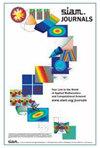Fully Bayesian Inference for Latent Variable Gaussian Process Models
IF 1.9
3区 工程技术
Q2 MATHEMATICS, INTERDISCIPLINARY APPLICATIONS
引用次数: 0
Abstract
SIAM/ASA Journal on Uncertainty Quantification, Volume 11, Issue 4, Page 1357-1381, December 2023.Abstract. Real engineering and scientific applications often involve one or more qualitative inputs. Standard Gaussian processes (GPs), however, cannot directly accommodate qualitative inputs. The recently introduced latent variable Gaussian process (LVGP) overcomes this issue by first mapping each qualitative factor to underlying latent variables (LVs) and then uses any standard GP covariance function over these LVs. The LVs are estimated similarly to the other GP hyperparameters through maximum likelihood estimation and then plugged into the prediction expressions. However, this plug-in approach will not account for uncertainty in estimation of the LVs, which can be significant especially with limited training data. In this work, we develop a fully Bayesian approach for the LVGP model and for visualizing the effects of the qualitative inputs via their LVs. We also develop approximations for scaling up LVGPs and fully Bayesian inference for the LVGP hyperparameters. We conduct numerical studies comparing plug-in inference against fully Bayesian inference over a few engineering models and material design applications. In contrast to previous studies on standard GP modeling that have largely concluded that a fully Bayesian treatment offers limited improvements, our results show that for LVGP modeling it offers significant improvements in prediction accuracy and uncertainty quantification over the plug-in approach.
潜变量高斯过程模型的完全贝叶斯推理
SIAM/ASA 不确定性量化期刊》,第 11 卷第 4 期,第 1357-1381 页,2023 年 12 月。 摘要。实际工程和科学应用往往涉及一个或多个定性输入。然而,标准高斯过程(GPs)无法直接适应定性输入。最近推出的潜变量高斯过程(LVGP)克服了这一问题,它首先将每个定性因子映射到底层潜变量(LVs),然后使用这些 LVs 上的任何标准 GP 协方差函数。LVs 的估计方法与其他 GP 超参数类似,都是通过最大似然估计,然后插入预测表达式。然而,这种插入式方法不会考虑 LV 估计中的不确定性,尤其是在训练数据有限的情况下,这种不确定性可能非常大。在这项工作中,我们为 LVGP 模型开发了一种完全贝叶斯方法,并通过其 LVs 直观显示定性输入的效果。我们还开发了 LVGP 放大近似值和 LVGP 超参数的全贝叶斯推断。我们进行了数值研究,在一些工程模型和材料设计应用中比较了插件推断和完全贝叶斯推断。以往对标准 GP 建模的研究大多认为全贝叶斯方法的改进有限,与此不同的是,我们的研究结果表明,对于 LVGP 建模,全贝叶斯方法比插件方法在预测精度和不确定性量化方面都有显著改进。
本文章由计算机程序翻译,如有差异,请以英文原文为准。
求助全文
约1分钟内获得全文
求助全文
来源期刊

Siam-Asa Journal on Uncertainty Quantification
Mathematics-Statistics and Probability
CiteScore
3.70
自引率
0.00%
发文量
51
期刊介绍:
SIAM/ASA Journal on Uncertainty Quantification (JUQ) publishes research articles presenting significant mathematical, statistical, algorithmic, and application advances in uncertainty quantification, defined as the interface of complex modeling of processes and data, especially characterizations of the uncertainties inherent in the use of such models. The journal also focuses on related fields such as sensitivity analysis, model validation, model calibration, data assimilation, and code verification. The journal also solicits papers describing new ideas that could lead to significant progress in methodology for uncertainty quantification as well as review articles on particular aspects. The journal is dedicated to nurturing synergistic interactions between the mathematical, statistical, computational, and applications communities involved in uncertainty quantification and related areas. JUQ is jointly offered by SIAM and the American Statistical Association.
 求助内容:
求助内容: 应助结果提醒方式:
应助结果提醒方式:


